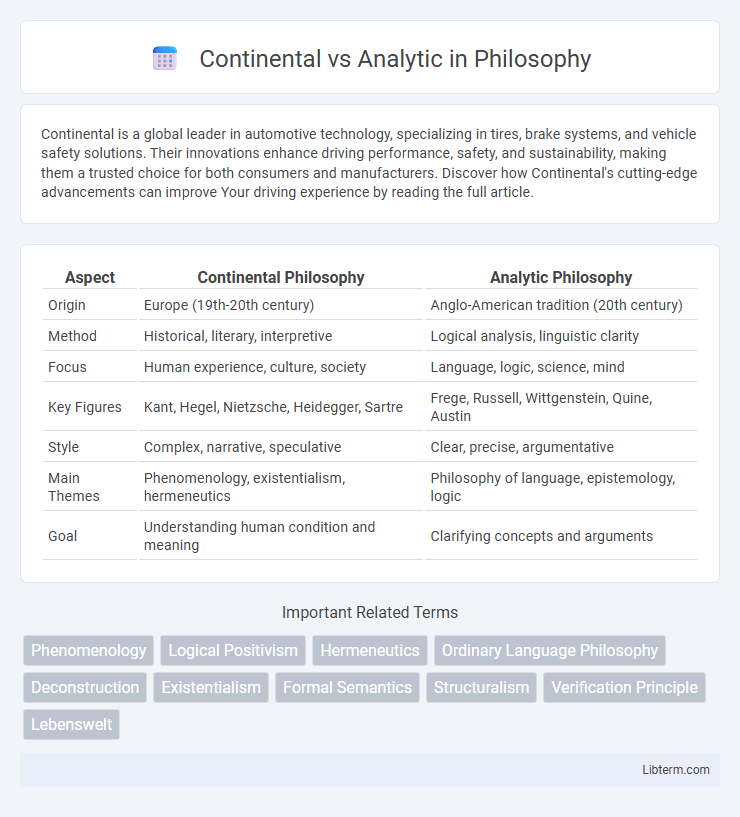Continental is a global leader in automotive technology, specializing in tires, brake systems, and vehicle safety solutions. Their innovations enhance driving performance, safety, and sustainability, making them a trusted choice for both consumers and manufacturers. Discover how Continental's cutting-edge advancements can improve Your driving experience by reading the full article.
Table of Comparison
| Aspect | Continental Philosophy | Analytic Philosophy |
|---|---|---|
| Origin | Europe (19th-20th century) | Anglo-American tradition (20th century) |
| Method | Historical, literary, interpretive | Logical analysis, linguistic clarity |
| Focus | Human experience, culture, society | Language, logic, science, mind |
| Key Figures | Kant, Hegel, Nietzsche, Heidegger, Sartre | Frege, Russell, Wittgenstein, Quine, Austin |
| Style | Complex, narrative, speculative | Clear, precise, argumentative |
| Main Themes | Phenomenology, existentialism, hermeneutics | Philosophy of language, epistemology, logic |
| Goal | Understanding human condition and meaning | Clarifying concepts and arguments |
Introduction: Defining Continental vs Analytic Philosophy
Continental philosophy primarily explores existential, phenomenological, and critical theory themes, emphasizing historical context and broad cultural critique. Analytic philosophy prioritizes logical clarity, linguistic analysis, and argumentation rooted in formal reasoning and scientific methodology. These foundational differences shape distinct approaches to understanding knowledge, reality, and language within each tradition.
Historical Origins and Development
Continental philosophy originated in 19th-century Europe, primarily Germany and France, evolving from German idealism, phenomenology, and existentialism with key figures such as Hegel, Husserl, and Heidegger shaping its development. Analytic philosophy emerged in early 20th-century Britain, focusing on logical analysis and language, influenced by thinkers like Frege, Russell, and Wittgenstein. The divergence reflects different historical contexts and intellectual traditions, Continental emphasizing historical and cultural critique, while Analytic prioritizes linguistic clarity and formal logic.
Core Philosophical Themes and Approaches
Continental philosophy emphasizes historical context, existential experience, and critique of modernity, often exploring themes like phenomenology, hermeneutics, and dialectics. Analytic philosophy prioritizes clarity, logical analysis, and language precision, focusing on epistemology, metaphysics, and the philosophy of science. Core differences lie in Continental's interpretive, narrative style versus Analytic's emphasis on argumentative rigor and formal logic.
Key Figures in Continental Philosophy
Key figures in Continental philosophy include Immanuel Kant, Georg Wilhelm Friedrich Hegel, Friedrich Nietzsche, Martin Heidegger, and Jean-Paul Sartre, whose works emphasize existentialism, phenomenology, and critical theory. Their approach contrasts with Analytic philosophy's focus on logic, language, and scientific methodology, led by figures such as Bertrand Russell, Ludwig Wittgenstein, and Alfred Tarski. Continental philosophy prioritizes historical context, subjective experience, and dialectical methods, shaping discussions on metaphysics, ethics, and human freedom.
Key Figures in Analytic Philosophy
Analytic philosophy, characterized by figures such as Bertrand Russell, Ludwig Wittgenstein, and Willard Van Orman Quine, emphasizes clarity, logical analysis, and language precision. Continental philosophy, with key thinkers like Martin Heidegger, Jean-Paul Sartre, and Michel Foucault, explores themes of existence, phenomenology, and social critique. The analytic tradition prioritizes argumentative rigor and formal logic, contrasting with Continental philosophy's focus on historical context and subjective experience.
Methodological Differences
Continental philosophy employs a holistic, interpretive approach emphasizing historical context, culture, and subjective experience, often using dialectics and phenomenology to explore concepts. Analytic philosophy focuses on logical clarity, argumentative rigor, and linguistic analysis, prioritizing formal logic and empirical evidence to dissect philosophical problems. These methodological differences reflect divergent aims: Continental prioritizes meaning and existential depth, while Analytic seeks precision and argumentative soundness.
Language, Logic, and Meaning
Continental philosophy emphasizes language as a living practice intertwined with history, culture, and human experience, often exploring meaning through narrative, metaphor, and existential context. Analytic philosophy prioritizes precise logical analysis and formal language structures to clarify meaning, focusing on syntax, semantics, and truth conditions. The Continental approach views meaning as fluid and contingent, while the Analytic tradition treats meaning as stable and logically determinate.
Influence on Contemporary Thought
Continental philosophy, rooted in German idealism and existentialism, profoundly shapes contemporary thought by emphasizing subjectivity, culture, and historical context, influencing fields like critical theory and phenomenology. Analytic philosophy, grounded in logic and language analysis, drives advancements in formal semantics, philosophy of mind, and epistemology, prioritizing clarity and argumentative rigor. The interplay between these traditions enriches modern intellectual discourse by merging conceptual precision with critical cultural analysis.
Criticisms and Common Misconceptions
Continental philosophy often faces criticism for its perceived obscurity and lack of rigorous argumentation, with some accusing it of being overly abstract and inaccessible. Analytic philosophy is commonly misunderstood as solely focused on formal logic and language analysis, overlooking its engagement with broader metaphysical and ethical issues. Both traditions sometimes suffer from stereotypes that hinder productive dialogue, despite their complementary strengths in addressing philosophical problems.
Bridging the Divide: Toward Philosophical Integration
Continental and analytic philosophy each offer rich methodologies, with Continental emphasizing historical context and critique, while analytic prioritizes clarity and logical rigor. Bridging the divide involves integrating Continental's expansive thematic approaches with analytic precision to foster comprehensive understanding. This philosophical integration promotes dialogue across traditions, enriching metaphysics, ethics, and linguistic analysis through combined insights.
Continental Infographic

 libterm.com
libterm.com